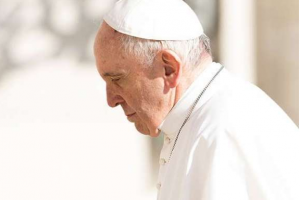CNA, CBJ—The Vatican’s Dicastery for Bishops has completed a formal investigation of Bishop Joseph E. Strickland and the Diocese of Tyler, Texas, according to multiple media reports and confirmed by EWTN News.
Apolstolic Visitation
 The inquiry, known as an apostolic visitation, marks a rare though not unprecedented intervention by Rome into a U.S. diocese and points to possible disciplinary action against Strickland, a faithful bishop well-known for his clear defense of the unborn, marriage between a man and a woman, the traditional Latin liturgy and clarity of Catholic teachings.
The inquiry, known as an apostolic visitation, marks a rare though not unprecedented intervention by Rome into a U.S. diocese and points to possible disciplinary action against Strickland, a faithful bishop well-known for his clear defense of the unborn, marriage between a man and a woman, the traditional Latin liturgy and clarity of Catholic teachings.
The leader of the eastern Texas diocese since 2012, Strickland, 64, has faced criticism for what CNA describes as “what some see as intemperate social media posts unbecoming of a prominent U.S. prelate, including a May 12 tweet that suggested Pope Francis was ‘undermining the Deposit of Faith.'”
Eucharistic procession and prayer to counter publicly anti-Catholic group
Bishop Strickland recently played a prominent role in a Eucharistic procession and prayer rally in Los Angeles on June 16 organized to protest Major League Baseball’s Los Angeles Dodgers for honoring an anti-Catholic drag group at the team’s “Pride Night” game.
Though hailed for his leadership in some circles for joining the Dodgers protest, others saw the involvement of a bishop from another diocese as a breach of ecclesiastical protocol. The Archdiocese of Los Angeles, which condemned the Dodgers’ actions, emphasized in a statement that it had not given “backing or approval” for the rally.
Catholic Business Journal wonders why diocesan approval is even relevant for a prayer rally quickly organized by local Catholics, including clergy, to counter a very public, in-your-face anti-Catholic display by a group being honored by a local pro-sports team.
Synodality concerns
More recently, on June 21, Strickland criticized a newly released Vatican document that  suggests topics for discussion at an October assembly tied to the ongoing Synod on Synodality — including questions related to women deacons, married priests and calls for greater inclusion for LGBT people.
suggests topics for discussion at an October assembly tied to the ongoing Synod on Synodality — including questions related to women deacons, married priests and calls for greater inclusion for LGBT people.
“It is a travesty that these things are even proposed for discussion. I pray that all who truly know Jesus Christ will not be deceived by this path,” he tweeted. “The Gospel welcomes all to repentance and sanctity, if there is no repentance the barriers to sanctity remain.”
How was the aposotolic visitation conducted?
According to a source in the diocese who spoke with EWTN News, the apostolic visitation consisted of interviews with diocesan clergy and laity throughout the preceding week before concluding on Saturday morning with a meeting with Strickland. Bishop Emeritus Gerald Kicanas of Tucson—the only bishop in the history of the United States Council of Catholic Bishops (USCCB) who was not elected president of the USCCB after serving as vice president—and Bishop Dennis Sullivan of Camden, New Jersey, led the inquiry.
According to the source, reports CNA, the process addressed the bishop’s social media use but also questions related to diocesan management.
During Strickland’s 10-plus years at the helm of Tyler, the diocese has experienced some noteworthy changes, such as the 2018 resignation of three diocesan officials, a move Strickland said at the time would position the diocese to best fulfill its mission.
Strickland’s tenure marked by Spiritual Growth and Administrative Health
But Strickland’s tenure has also coincided with positive signs of spiritual and administrative health in Tyler. Currently, 21 men are in priestly formation for the territory of only 55,000 Catholics, a rate of seminarians-per-Catholic considerably higher than most other U.S. dioceses. The diocese is also reportedly in good financial shape, exemplified in part by the its ability to raise 99% of its $2.3 million goal for the 2021 bishop’s appeal six months ahead of schedule.
The path forward following the apostolic visitation remains uncertain. While one source described as someone close to Strickland told the Pillar that the Tyler bishop “doesn’t want to make too big of a deal” of the visitation, a priest related that interviewers “were already asking questions about who might be a good fit to replace [Strickland].”
Other apostolic visitations
According to the Dicastery for the Doctrine of the Faith (DDF), an apostolic visitation is an “exceptional initiative of the Holy See” that involves a delegated visitor or visitors being sent to evaluate an ecclesial institute, such as a seminary, diocese, or religious order, on behalf of the pope. 
“Apostolic visitations are intended to assist the institute in question to improve the way in which it carries out its function in the life of the Church,” according to a glossary of terms provided by the DDF.
An apostolic visitation is a specific form of canonical visitation, which is any instance of an ecclesial superior visiting or sending a delegate to persons or institutions under their authority to maintain sound doctrine and morals or correct abuses. The pope can initiate apostolic visitations throughout the universal Church in his capacity as the supreme pontiff.
Different from other papal delegates
Apostolic visitors differ from other papal delegates, such as nuncios assigned to a specific country, in that their mission is more specific and transient, usually focused on a particular episode or emergency that has emerged.
The scope and abilities of a specific apostolic visitation are determined by their associated mandate given by the pope, and conclude when the responsible delegate submits a formal written report to the Holy See.
The practice has been employed frequently by Pope Francis during his 10 years as pontiff.
Bishop Daniel Fernandez Torres — removed as bishop of the Diocese of Arecibo, Puerto Rico based on apostolic visitation by Chicago’s Cardinal Cupich – No reason given
Bishop Daniel Fernandez Torres of the Diocese of Arecibo in Puerto Rico was reportedly the subject of an apostolic visitation made by Chicago’s Cardinal Blase Cupich before his removal from office on March 9, 2022.
Although the Vatican never provided any official reason for his removal, the metropolitan archbishop of Puerto Rico said it was due to “insubordination to the pope,” likely related to Bishop Fernandez Torres breaking from his fellow Puerto Rican bishops by not sending his diocese’s seminarians to a newly established national seminary and also refusing to sign a joint statement on the duty to receive a COVID-19 vaccination.
Several other bishops have also been removed from their dioceses or requested “early retirement” following apostolic visitations in recent years.
Bishop Martin D. Holley — removed from Diocese of Memphis based on apostolic visitation by Archbishops Wilton Gregory and Bernard Hebda
Bishop Martin D. Holley was removed from the Diocese of Memphis on Oct. 24, 2018, following a three-day apostolic visitation in June 2018 by Archbishops Wilton Gregory (then archbishop of Atlanta) and Bernard Hebda of St. Paul and Minneapolis that reportedly looked into allegations of mismanagement of diocesan personnel and finance.
Bishop Rogelio Livieres Plano — removed from Paraguay diocese based on apostolic visitation
In Paraguay, Bishop Rogelio Livieres Plano was removed from governance of the Diocese of Ciudad del Este on Sept. 25, 2014, following accusations of a lack of collegiality following an apostolic visitation that took place in July of that year.
Bishop Richard Malone from Buffalo, NY — Early retirement request following apostolic visitation
And in Buffalo, Pope Francis accepted the “early retirement” request of Bishop Richard Malone in December 2019 after the bishop had faced significant criticism for his handling of clerical sex abuse in the diocese and was the recipient of an apostolic visitation in October 2019.
Bishop Richard Stika — asked to resign and retire early, but refused
The Vatican also reportedly sent an apostolic visitation to the Diocese of Knoxville in November 2022, where Bishop Richard Stika has recently been embroiled in allegations of sex abuse cover-up. The Vatican has reportedly asked Stika to resign, but he remains in office
Diocese of Toulon-Fréjus, France — leading source of French vocations — 2023 apostolic visitation announced
Earlier this year, the Dicastery for Bishops launched an apostolic visitation of the Diocese of Toulon-Fréjus, a leading source of vocations in France. Another high-profile visitation took place in Ireland in 2010–2011.
Apostolic visitations to dioceses with embattled bishops do not always result in discipline or removal of the local ordinary.
Cardinal Rainer Maria Woelki in Cologne, France — resignation after visitation not accepted by Pope
Cologne’s Cardinal Rainer Maria Woelki was the subject of an apostolic visitation in May 2021 amid fierce criticism over the way the German prelate had handled abuse cases in his archdiocese, but Pope Francis did not accept Woelki’s offer of resignation after the visitation found that he had not broken canon law.
Previously, apostolic visitations were conducted to U.S. seminaries (1983–1987), women’s religious institutions in the U.S. (2009–2012), and the Legionaries of Christ (2009) after their founder was discovered to have committed numerous acts of sexual and psychological abuse.
Disgraced cardinal Theodore McCarrick — never subjected to an apostolic visitation
Notably, there has never been an apostolic visitation related to former cardinal Theodore McCarrick, formerly the archbishop of Washington and head of the U.S. Conference of Catholic Bishops who was found guilty of serial sexual abuse, despite recent requests from U.S. Church leadership.
In some cases, such as the apostolic visitation to Institutions of Women Religious in the United States that concluded in 2012, a full report of the findings was published by the Vatican. More often, however, the details of apostolic visitations are not made public.
Concerns about Transparency
The lack of full transparency has frequently created scenarios in which bishops removed from office accuse the Vatican or others of foul play. Bishop Holley, for instance, said he wasn’t removed over “mismanagement” but as an act of “revenge” by Cardinal Donald Wuerl of Washington, who influenced the papal nuncio to call for an investigation. Bishop Fernández Torres of Puerto Rico said his removal from office was “totally unjust” and violated due process.
RELATED RESOURCES:




You must be logged in to post a comment.